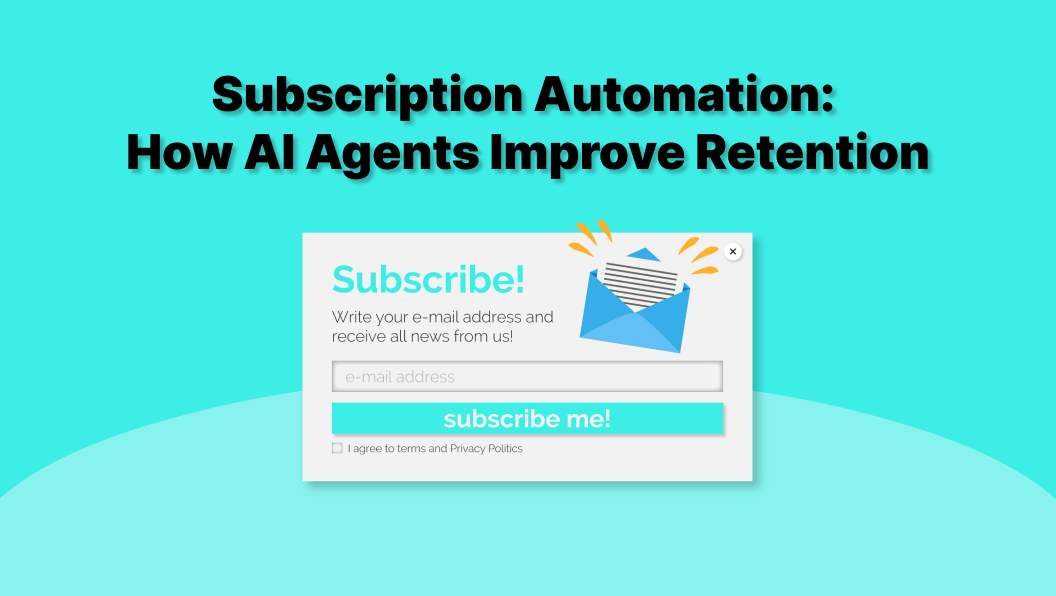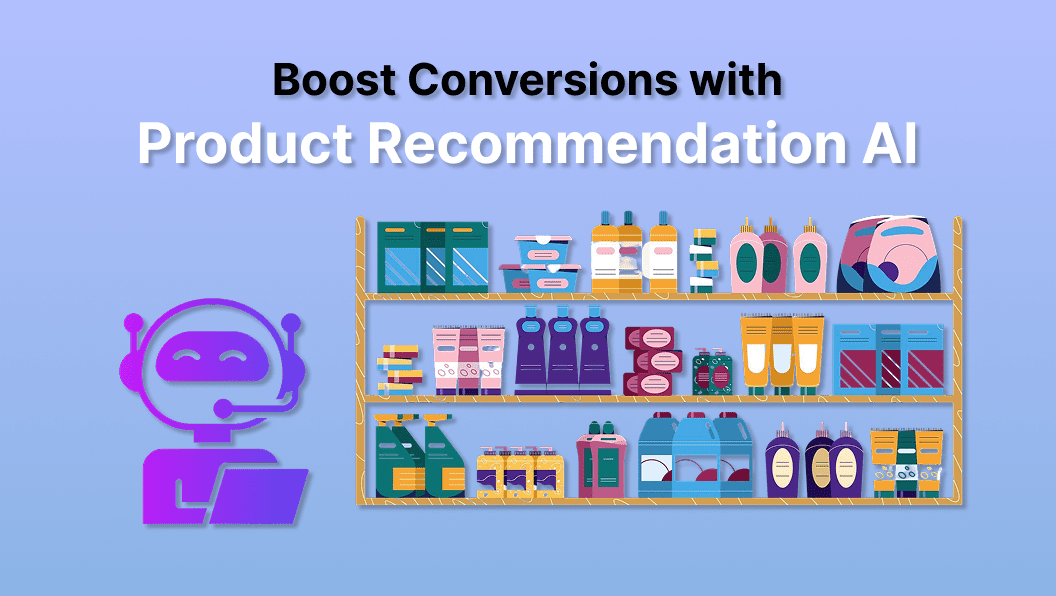According to a recent report by McKinsey, businesses that adopt AI-powered customer service tools have reported up to 30% improvement in response time and a 20–25% reduction in operational costs. Moreover, a Gartner study reveals that by 2026, more than 80% of customer service interactions will be handled by AI, up from just 19% in 2022.
With this growing reliance on automation, companies are racing to find the right tools to meet these expectations while keeping costs manageable.
Decagon AI is a fast-rising platform designed specifically to automate customer support using advanced generative AI. Instead of offering generic bots or rigid scripts, Decagon AI agents are designed to understand context, learn from real conversations, and resolve queries just like a trained human support rep.
In this article, we’ll break down everything you need to know about Decagon AI and help you understand if it is the right fit for your support automation goals, or if a different platform might better meet your needs.
What Is Decagon AI?
Today, companies are under constant pressure to deliver faster, smarter, and more personalized customer support. That’s exactly where Decagon AI steps in. It’s a modern AI platform that’s designed to take the heavy lifting off support teams by automating complex customer conversations, without compromising the quality or human touch.
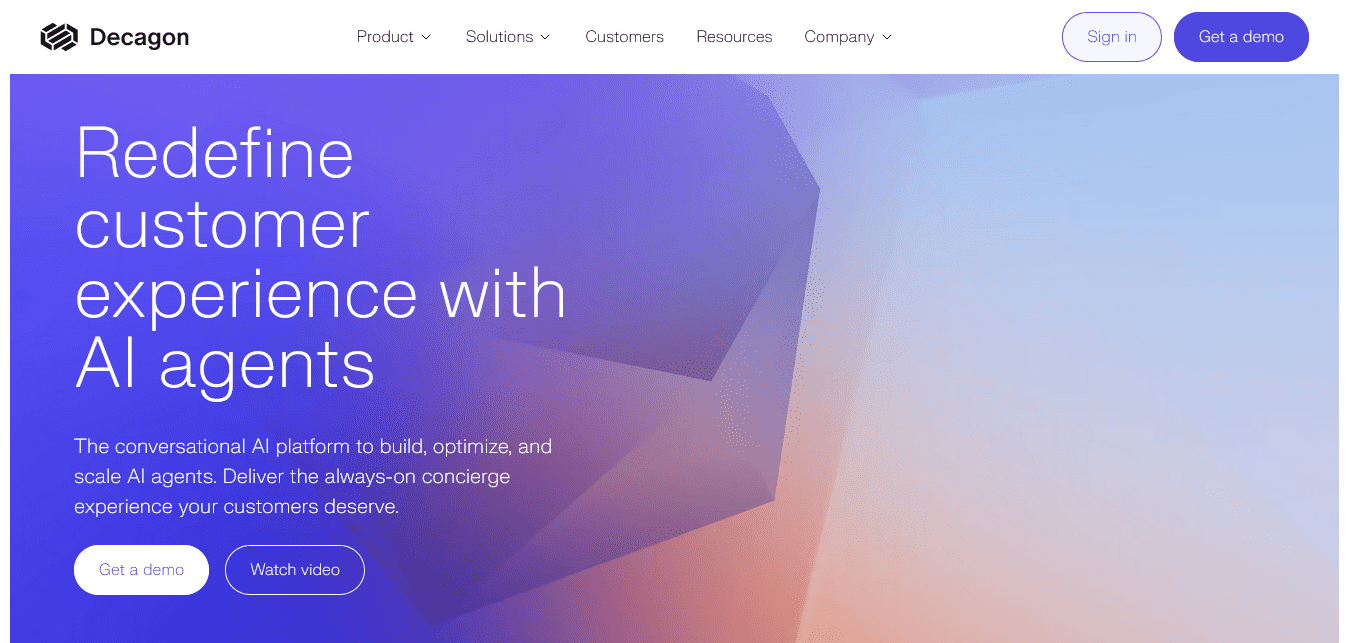
Decagon AI has quickly become a trusted name in the world of customer support automation. What sets it apart is its focus on enterprise-grade generative AI, which goes far beyond basic chatbot interactions. Instead of relying on simple keyword matching or pre-programmed scripts, Decagon AI agents use advanced natural language processing (NLP) and machine learning to actually understand customer intent, learn from previous interactions, and perform real-time actions like processing refunds, updating orders, or escalating tickets.
The vision behind Decagon AI is to create support systems that are as intelligent and helpful as human agents. In fact, one of its co-founders, Jesse Zhang, who previously worked as a software engineer at Google, has emphasized the importance of replicating human-level reasoning in AI. His experience building user-centric platforms, like Lowkey (a social gaming startup later acquired by Niantic), has shaped the product’s design to be intuitive and scalable.
Decagon AI agents are not just good at holding conversations; they’re capable of taking real actions by connecting with your backend systems like CRMs, payment platforms, and ticketing tools. This allows businesses to automate not just simple Q&A tasks, but also end-to-end workflows.
Since launching, Decagon AI has attracted significant attention in the tech and VC space. In 2023, the startup raised $10 million in seed funding from top-tier investors, including Andreessen Horowitz. Just a year later, it secured an additional $25 million in Series A funding, which helped expand its AI capabilities and scale operations globally.
How Decagon AI Works: Strengths & Limitations
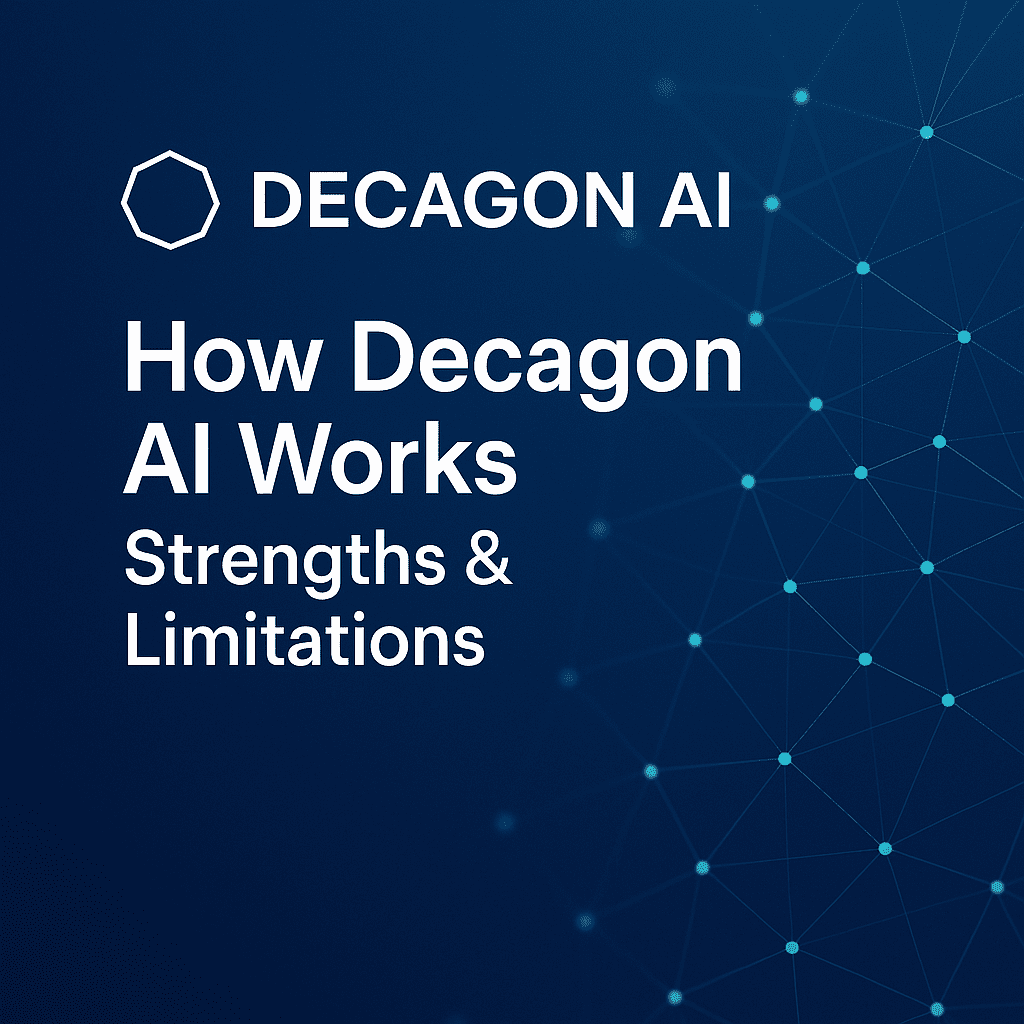
To truly understand the value of Decagon AI, it’s important to look beyond the surface and explore how it actually works. Unlike traditional chatbots that follow fixed rules or scripts, Decagon AI uses real-time learning, automation, and natural language understanding to engage with customers in a more human-like and effective way.
At the heart of the system are Decagon AI customer service agents, which are powered by advanced generative AI models. These agents not only hold conversations but also take meaningful actions, learn from patterns, and adapt to each business’s specific customer needs.
Key Strengths of Decagon AI
Let’s break down the key strengths that make Decagon AI a standout platform in the world of automated support:
- Context-Aware Conversations
One of the biggest advantages of Decagon AI is its ability to understand and respond in context. Whether a customer is following up on an order or has a complex issue, the AI can refer back to previous interactions and respond accordingly, which makes the conversation feel seamless and intelligent.
- Learning through Every Interaction
The platform doesn’t just provide answers; it gets smarter with each conversation. Over time, Decagon AI customer service agents refine their understanding, reduce repetitive errors, and handle more complex scenarios without human help.
- Built-In Analytics and Insights
Through an AI-powered dashboard, businesses can view trends, detect unusual customer behavior, and receive suggestions to improve their knowledge base. This helps teams identify gaps in service and fine-tune their support strategies with real data.
- Seamless Channel Integration
Decagon AI connects effortlessly with a variety of platforms, including live chat, email, and social media. This ensures your customers receive consistent support—no matter how they reach out.
- Workflow Automation beyond Simple Tasks
The AI agents don’t stop at just answering questions. They can trigger actions like issuing refunds, updating order information, or tagging inquiries into categories—helping reduce the manual workload for human teams.
- Human-Like Experience
Unlike traditional bots that often sound robotic or limited, Decagon AI customer service agents respond in a more natural tone, increasing customer satisfaction and reducing the need for escalation to live agents.
Limitations to Consider Before Using Decagon AI
While Decagon AI brings powerful automation to the table, it’s not without a few challenges and limitations, especially for businesses new to AI adoption.
- Setup Requires Involvement
For the platform to deliver accurate results, businesses must feed it the right data, connect backend systems, and occasionally train it on industry-specific language or processes.
- Not Ideal for All Business Sizes
Although it’s marketed as scalable, smaller businesses with limited tech resources may find the initial onboarding process a bit overwhelming.
- Dependence on Data Quality
The accuracy of Decagon AI customer service heavily depends on the quality of past interactions and the clarity of business documentation. Poor or incomplete data can reduce its performance significantly.
- Still Needs Human Oversight for Edge Cases
While it handles most customer interactions well, there are still rare or sensitive cases where human involvement is needed. Businesses must be ready to step in when automation alone won’t cut it.
Decagon AI Pricing: Is It Cost-Effective?
When it comes to automating customer support, pricing isn’t just about affordability; it’s about value. Businesses want to know if we invest in this solution, will it really make a difference to our operations, customer satisfaction, and bottom line? In this case, Decagon AI pricing brings a fresh and flexible approach that reflects how AI-powered support tools are changing the landscape.
Unlike traditional software models that charge per user or “seat,” Decagon AI is built around usage-based pricing. That’s because Decagon AI agents aren’t tools for human agents; they are the agents, taking on real customer interactions and resolving issues independently. So, instead of measuring impact by headcount, the platform charges based on how much work the AI actually performs.
Two Flexible Pricing Models for Real-World Use
Decagon AI pricing offers two core options that allow businesses to choose the model that best suits their goals, budgets, and internal workflows:
1Per-Conversation Pricing
This is a fixed-rate model based on the number of customer conversations handled by the AI agents. Every interaction, whether it results in a full resolution or needs to be escalated, is billed at a predictable rate.
- Best for businesses seeking clarity and predictability
- Simple to forecast and budget
- Transparent tracking and invoicing
2Per-Resolution Pricing
In this model, you only pay when the Decagon AI agent fully resolves a customer query on its own. If the conversation is escalated or left unresolved, there’s no charge. This model comes at a slightly higher rate, reflecting the added value of complete automation.
- Ideal for businesses focused on outcome-based ROI
- Encourages higher deflection rates and complete task handling
- Cost scales with agent performance, not just usage
This flexible approach to pricing is one of the reasons why Decagon AI has gained attention from fast-growing companies like Notion, Webflow, and Duolingo. These brands want automation that performs, and they want the option to choose how they pay based on performance or predictability.
Is Decagon AI Really Cost-Effective?
In many cases, yes. When compared to the cost of hiring, training, and managing human agents, Decagon AI offers a high-value alternative, especially for companies with large volumes of repetitive customer support requests. Its ability to automate conversations, resolve issues without human intervention, and provide intelligent reporting adds up to major operational savings.
Plus, by automating the bulk of customer interactions, companies free up their human teams to handle more complex or high-value tasks, which increases productivity and improves the overall support experience.
That said; it’s important to keep a few things in mind:
- Companies with low ticket volumes may find it harder to justify the monthly costs.
- Businesses that require deeply personalized or high-touch support in every interaction may still need a strong human team.
So, while Decagon AI pricing is well-structured for fast-scaling companies and those handling high conversation volumes, it may not be a perfect fit for everyone.
Why it’s Still worth Looking at Alternatives
Decagon AI is an innovative platform with flexible pricing and powerful automation features, but no solution is one-size-fits-all. Depending on your budget, support model, and industry, you might find another tool that aligns more closely with your specific goals.
In the next section, we’ll explore the best Decagon AI alternatives available in 2025, so you can make a fully informed decision before committing to any one solution.
Top 8 Decagon AI Competitors
1. GPTBots – The Best Alternative to Decagon AI for Fast Automation

If you’re looking for a powerful yet simple solution to automate customer support with guaranteed performance, GPTBots is the most compelling among all Decagon AI competitors. It’s not just another chatbot builder; it’s a complete no-code platform for designing and deploying end-to-end AI agents with full control, fast setup, and clear return on investment.
What makes GPTBots truly unique is its laser focus on performance, usability, and business impact. Built for teams that prioritize measurable outcomes, GPTBots helps you launch AI-powered agents that not only respond to customer queries, but also solve real problems, trigger backend actions, and continuously improve through AI training cycles.
Whether you’re a startup looking to reduce support costs or an enterprise aiming to scale human-like support without hiring additional staff, GPTBots offers an unmatched combination of power, simplicity, and flexibility.
Key Features of GPTBots
- Advanced Natural Language Understanding
Comprehends nuanced customer queries, including slang, idioms, and context-specific language, to deliver more accurate and relevant responses that resonate with users.
- Real-Time Performance Monitoring
Track key metrics like resolution rate, response time, and customer satisfaction scores in a live dashboard, allowing teams to make immediate adjustments for optimal performance.
- Customizable Brand Voice
Tailor the AI's tone and language to match your brand's personality—whether it's formal, friendly, or casual—ensuring consistent communication across all touchpoints.
- Scalable Pricing Model
Choose from flexible plans based on usage, making it accessible for small teams and scalable for enterprise-level operations without hidden costs.
Pros and Cons of Using GPTBots
Pros:
- No-code builder makes agent creation easy for non-technical users
- Offers guaranteed ROI tracking with detailed performance metrics
- Can automate entire workflows, not just Q&A
- Fast deployment and flexible integration with third-party tools
- Scales easily across multiple teams and customer channels
- Transparent pricing with full control over usage
Cons:
- Might require some setup time to fully leverage API integrations
2. Sierra
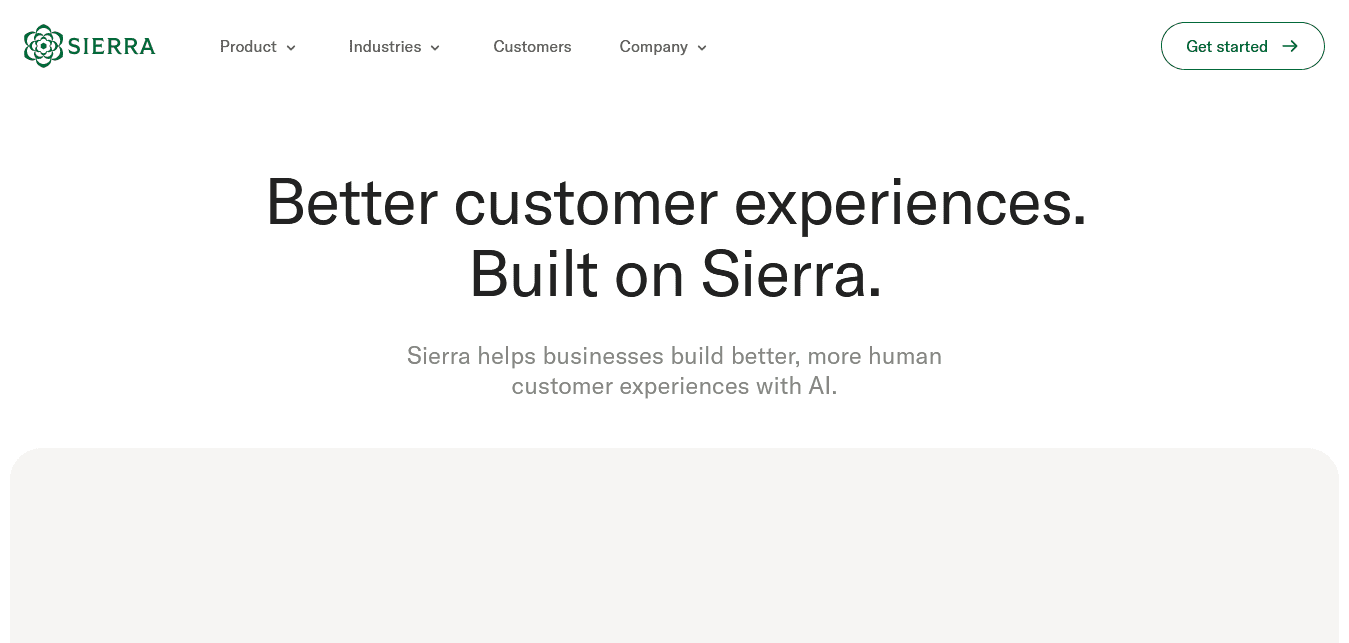
Sierra is another strong contender among top Decagon AI competitors, known for its enterprise focus and high level of AI customization. Launched in 2023, Sierra helps businesses build intelligent customer service agents that align closely with their brand tone, whether that’s professional, casual, or conversational. More than just answering inquiries, Sierra’s AI agents can execute backend tasks like updating CRM records or processing orders, offering a more action-oriented approach to support automation.
Sierra is known for its multi-model AI infrastructure, using language models from leading providers such as OpenAI, Anthropic, and Meta. This makes the platform more resilient and adaptable in real-time environments.
Notable Features of Sierra
- Strong personalization features for customer-facing interactions
- Performs backend actions, not just surface-level Q&A
- Built-in data privacy and encryption for enterprise compliance
Cons of Using Sierra
- Primarily outbound-focused; lacks robust support for inbound chats or call transfers
- Slower deployment process compared to more agile platforms
- Pricing is not transparent and tends to be enterprise-tier (starting near $150k/year)
- Rigid, linear workflows limit support for open-ended conversations
- Analytics are basic, offering only high-level insights
3. Gumloop
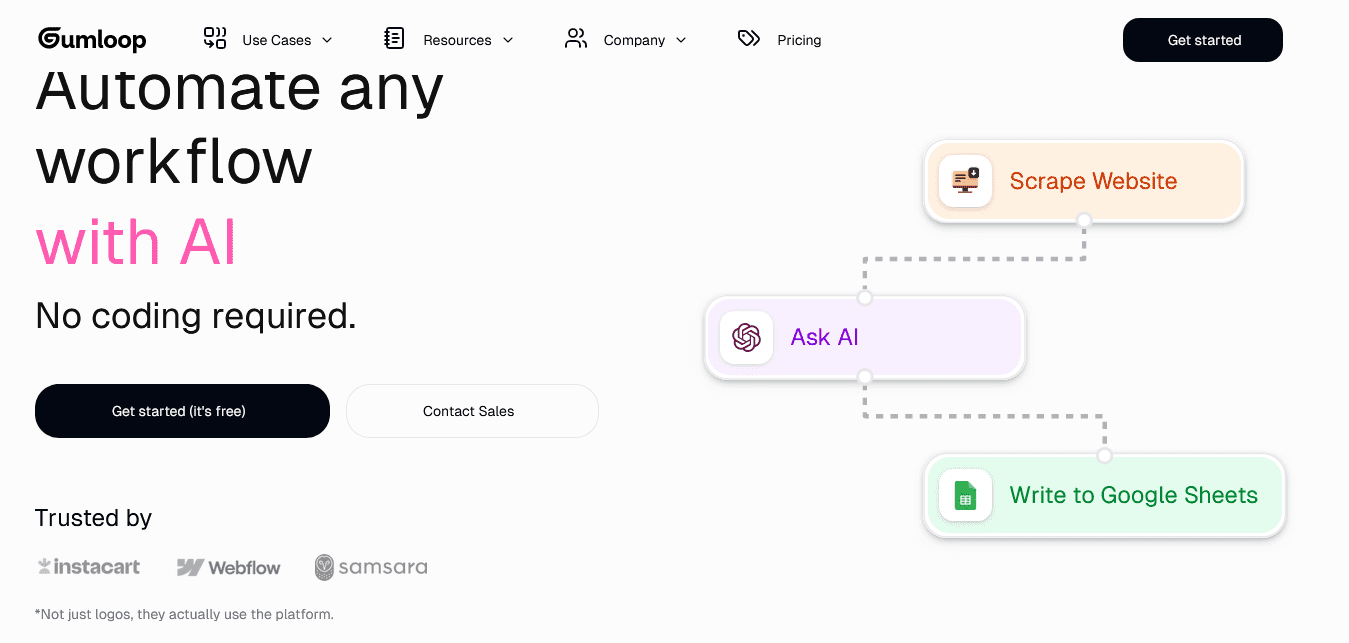
If you’re looking for a fresh, creative take on AI agent building, especially for marketing, automation, or data tasks, Gumloop is one of the most exciting Decagon AI competitors in the space today. Built by two Canadian founders in 2023, Gumloop combines the logic of Zapier with the power of language models like ChatGPT, offering a visual no-code platform for automating multi-step workflows.
Unlike traditional AI agent tools that focus solely on customer support, Gumloop supports a wide range of use cases, from web scraping and content generation to ad automation and SEO optimizations. It allows users to drag and drop “Nodes” (representing different services or tools), then connect them into “Flows” and “Subflows” to automate actions intelligently.
Why Gumloop Stands Out
- Ideal for marketers, creators, and operations teams
- Super flexible logic building, suitable for technical and non-technical users
- Scalable credit-based model allows you to grow usage gradually
Cons of Using Gumloop
- Focused more on general automation than deep customer support
- May require some trial and error for advanced multi-step logic
- Not as purpose-built for enterprise customer service as other tools in this list
4. Kore.ai
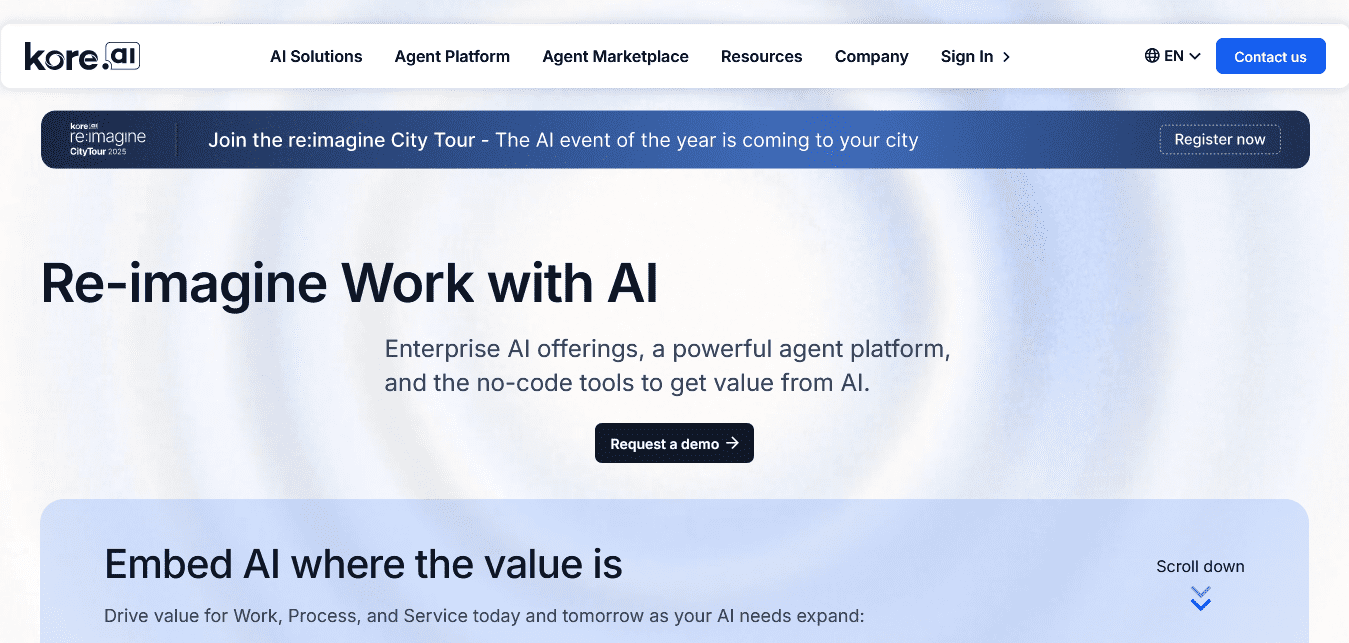
Kore.ai brings serious enterprise functionality into the world of AI agents, especially for voice and multi-channel automation. While many platforms focus solely on chatbots, Kore.ai allows businesses to design intelligent virtual assistants for over 35 different channels, including phone, social media, websites, mobile apps, and more.
Its visual no-code builder and library of pre-built AI agent templates (like HR bots, IT assistants, and customer service agents) make it a great choice for large companies that want rapid deployment and granular control. You also get access to advanced features like automated quality assurance, data masking, and usage governance, which are essential for compliance-heavy industries like healthcare, banking, or insurance.
Pros of Using Kore.ai
- Covers wide range of use cases and communication channels
- Drag-and-drop interface with generative AI add-ons
- Seamless integration with tools like Salesforce, ServiceNow, etc.
- Strong governance controls for large organizations
Cons of Using Kore.ai
- Can feel overwhelming for smaller teams or non-technical users
- Licensing and pricing structure may not be straightforward
- Slightly bulky compared to platforms focused purely on chat
5. Orq.ai
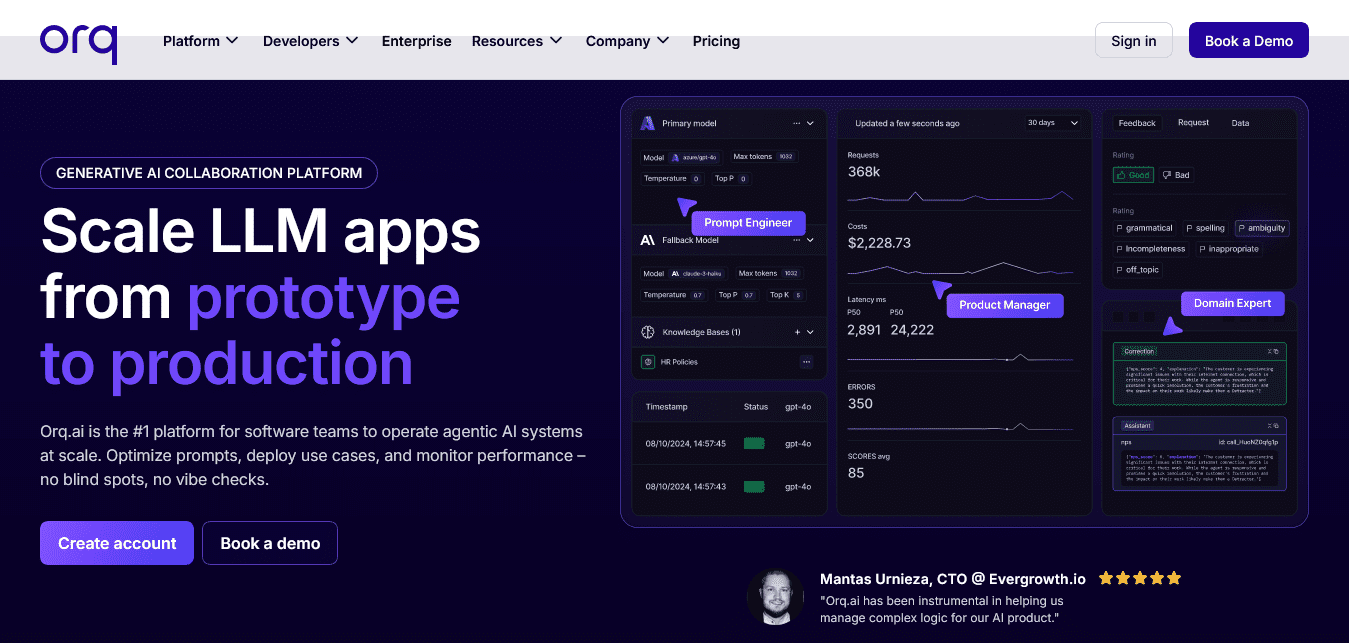
Among emerging Decagon AI competitors, Orq.ai stands out as a purpose-built platform that supports the entire lifecycle of GenAI-powered applications, from prototype to production. Designed for technical teams and enterprise AI strategists, Orq.ai fills a critical gap between experimentation and scalable deployment that most platforms overlook.
What makes Orq.ai different is its collaborative infrastructure tailored for building safe, complex, and multi-agent systems. It doesn’t just allow you to create agents; it offers deep observability, reasoning logic, security, and model orchestration all in one place. If your team is looking to build structured AI agents that can operate reliably in real-world customer service environments, Orq.ai is one of the most advanced options in the market.
Key Highlights of Orq.ai
- Route and manage requests across providers like OpenAI, Anthropic, and more, with fallback logic and retry systems
- Combine drag-and-drop agent building with deep code-level customization. Ideal for cross-functional teams
- Build agents that can think through multi-step tasks using structured workflows and state memory
- Use human feedback or automatic metrics to monitor and fine-tune output quality
Cons of Using Orq.ai
- Only suited for teams with engineering expertise
- May be overkill for basic workflows or small teams
- Lack of transparent pricing can make budgeting harder
- Launched in 2024, so long-term reliability is still unproven
6. Synthflow
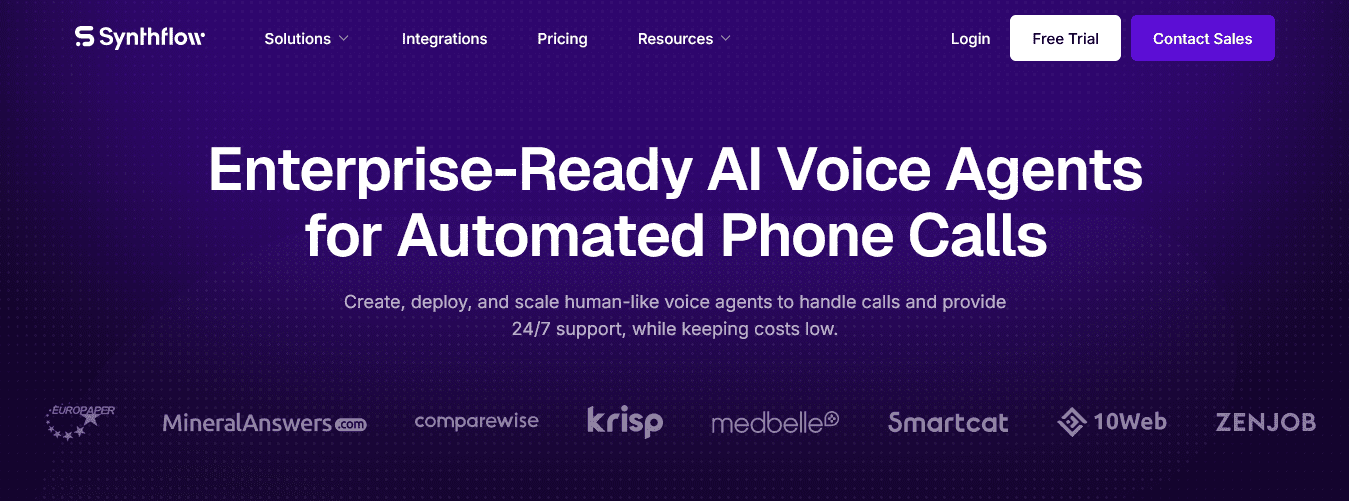
If your team is heavily reliant on phone-based communication, Synthflow is one of the most specialized Decagon AI competitors focused entirely on AI voice agents. Designed to automate inbound and outbound calling, Synthflow enables businesses to deploy AI voice agents that can book appointments, qualify leads, provide support, or handle call routing, all with enterprise-level security.
Unlike many generic platforms, Synthflow is laser-focused on voice automation and supports rapid deployment, often within just 3 weeks. The platform also includes a compliance-friendly environment for regulated industries and multilingual capabilities for global outreach.
Pros
- Fast setup (live in 3 weeks or less)
- Low starting price ($0.08/min)
- No-code interface for building agents
- Pre-built templates to accelerate onboarding
Cons of Using Synthflow
- Voice-first platform; lacks chat or social media support
- Limited analytics depth compared to broader customer service tools
7. Stack AI
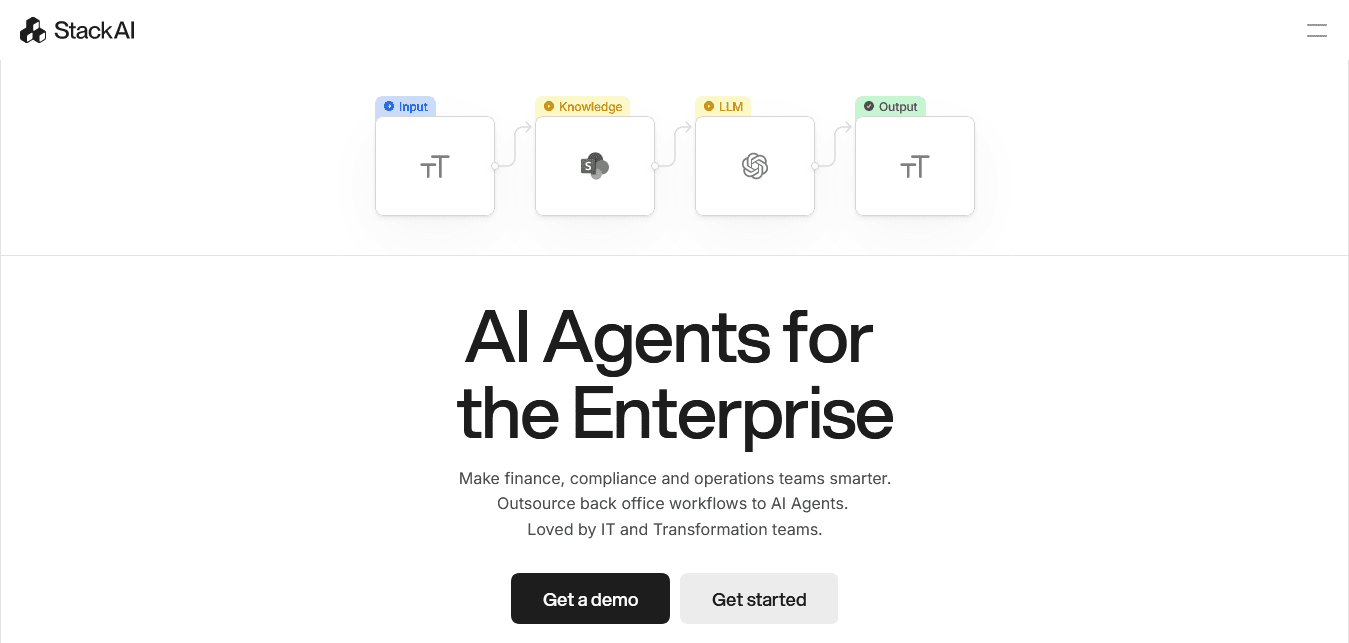
Stack AI is a powerful no-code platform for building automated workflows and AI agents, with a focus on scalability and usability. Though built with larger enterprises in mind, its pricing tiers also make it a good option for mid-market and growing teams looking to automate internal processes or customer-facing workflows.
As a Decagon AI competitor, Stack AI stands out with its wide selection of templates and strong support across industries like healthcare, education, and finance. Whether you’re building a customer support bot or an internal assistant, Stack AI helps you ship quickly, without code.
Why Consider Stack AI
- No-code interface ideal for cross-functional teams
- Affordable for mid-size businesses
- Supports a wide range of use cases
- 7-day free trial available
Cons of Using Stack AI
- Less customizable than developer-centric tools like LangChain
- Not as feature-rich for voice or advanced analytics
8. LangChain
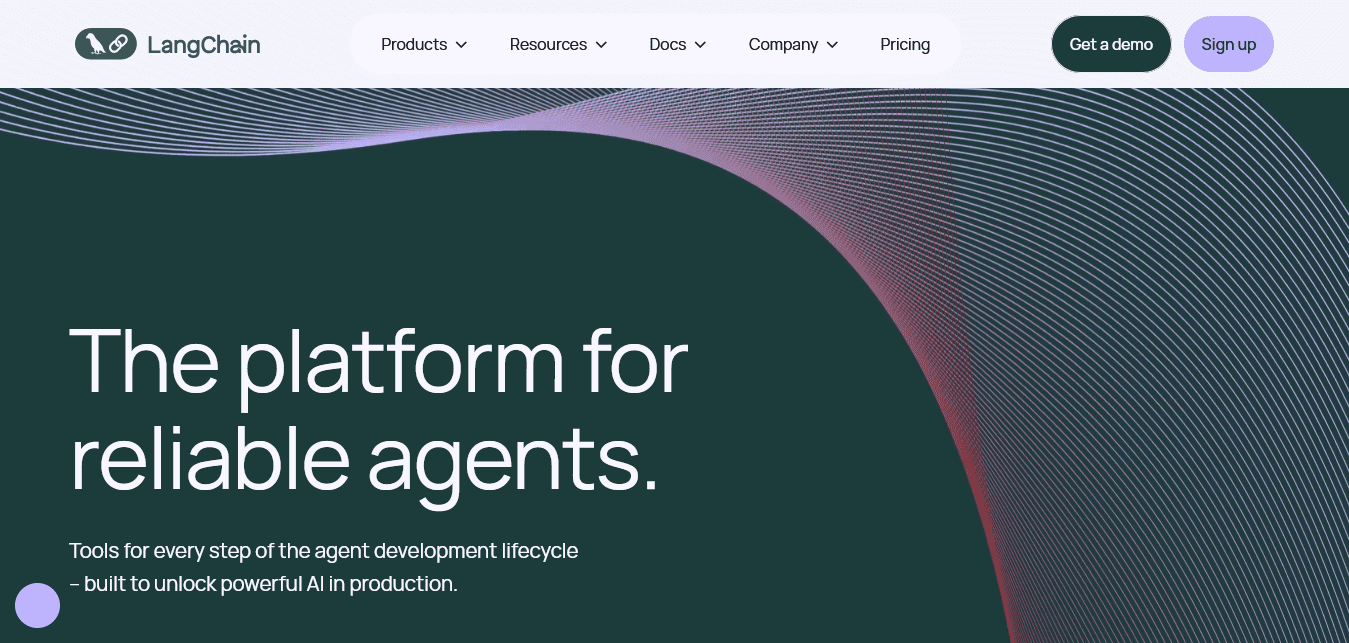
LangChain is one of the most powerful and flexible open-source tools for building LLM-powered agents from scratch. While it’s not an all-in-one platform like Decagon AI, it offers deep-level control for developers who want to engineer custom agent logic, memory handling, and tool interactions across diverse use cases.
With LangChain, you can construct workflows using modular components and integrate them into real-time production systems. Its LangGraph extension allows for graph-based agent orchestration, ideal for multi-step reasoning tasks or complex decision trees.
Key Capabilities of LangChain
- Unmatched flexibility for advanced use cases
- Integrates with tools like Orq.ai, RAG pipelines, etc.
- Large community and extensive documentation
Cons
- Not beginner-friendly, requires technical knowledge
- Lacks built-in deployment or observability tools
- Collaboration and monitoring must be handled separately
Comparison of 8 Decagon AI Competitors
Tool |
Strengths |
Weaknesses |
Best For |
Pricing Transparency |
Custom Workflows
|
Revenue Impact
|
Ease of Setup |
GPTBots |
No-code builder, ROI-focused, end-to-end agent creation, measurable outcomes |
Limited brand awareness (newer platform) |
Teams needing fast ROI and measurable automation |
High |
Full |
Guaranteed ROI Tracking |
Very Easy (No-Code) |
Sierra |
Multi-LLM integration, task-oriented agents, brand voice customization |
Outbound-only, slow deployment, expensive for SMBs |
Enterprise customer engagement |
Low (Custom Pricing) |
Limited |
Strong (at scale) |
Complex, Slow (1–2 months) |
Gumloop |
No-code + AI-first automation, subflows, ready templates |
Not ideal for deep analytics or regulated industries |
Marketing & automation teams |
High |
Full |
Indirect impact |
Easy (Visual Builder) |
Kore.ai |
Voice/chat agents, 35+ channels, strong governance, agent marketplace |
Interface complexity, steeper learning curve |
Enterprises in retail, banking, or insurance |
Medium |
Full |
High (via personalization) |
Moderate (Enterprise focus) |
Orq.ai |
Full lifecycle from prototype to production, hybrid editor, observability |
More technical setup, better for dev teams |
Enterprise AI teams with compliance needs |
Medium |
Full |
High (scalable & traceable) |
Moderate (Dev-oriented) |
Synthflow |
Voice AI, multilingual, secure, fast setup, compliant |
Voice-only focus, limited analytics depth |
Call-based customer service and lead handling |
High |
Limited |
High (for voice ops) |
Very Easy (Live in 3 weeks) |
Stack AI |
No-code, strong templates, enterprise-ready |
Less flexible than dev tools, weaker analytics |
Mid-market and enterprise automation |
High |
Moderate |
Moderate / High |
Easy (No-Code with Templates) |
LangChain |
Advanced orchestration, modular, developer control, vast ecosystem |
Steep learning curve, no built-in deployment or monitoring |
Mid-market and enterprise automation |
Open-source |
Full (Dev-first) |
High (custom optimization) |
Hard (Requires Engineering) |
Crux of the Matter
As businesses increasingly turn to automation to streamline customer service, tools like Decagon AI are playing a pivotal role in reshaping how support is delivered. With its advanced AI-powered agents, flexible pricing models, and impressive client list, Decagon AI certainly offers a compelling case for companies looking to modernize their support operations.
However, like any evolving technology, Decagon AI has its limitations, especially for teams needing faster deployment, deeper customization, or guaranteed returns on investment. Its success-based pricing sounds attractive but can introduce ambiguity in defining outcomes.
For companies that need clearer a quicker time-to-value, exploring alternatives becomes not just a preference, but a strategic necessity.
That’s where GPTBots comes out as a top contender among Decagon AI competitors. Built with measurable ROI at its core, GPTBots offers a no-code environment that allows you to create end-to-end AI agents without complex technical setup.
Why GPTBots Leads the Pack:
- No-code agent builder, zero technical friction
- Enterprise-ready with scalable architecture
- Faster time-to-deploy compared to most platforms
- Tailored for teams who need results, not just automation
If you’re evaluating tools that offer the efficiency of Decagon AI agents but with more control, visibility, and better pricing flexibility, GPTBots is not just a competitor, it’s the smarter alternative.
Get a Custom Demo




